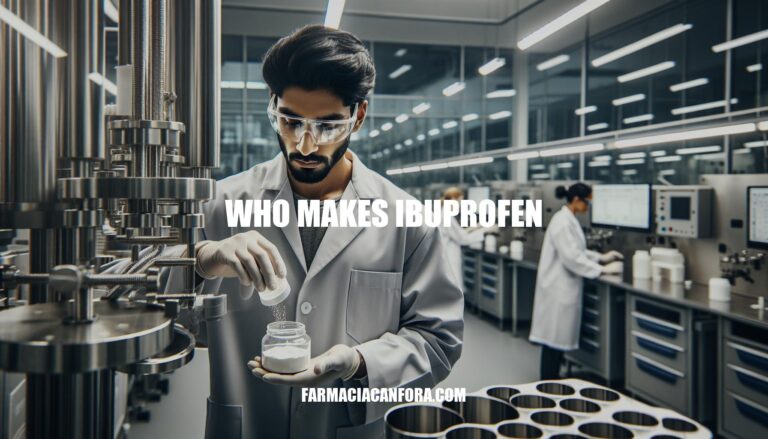


Ibuprofen, a widely used non-steroidal anti-inflammatory drug (NSAID), is produced by several key manufacturers. Major brands include Advil by Pfizer, Motrin by Johnson & Johnson, and Nurofen by Reckitt Benckiser. These companies play a significant role in the pharmaceutical industry, ensuring the availability of effective pain relief options globally.
Here are some of the major global manufacturers of ibuprofen:
These companies are key players in the production and distribution of ibuprofen worldwide.
Generic drug manufacturers play a crucial role in making medications like ibuprofen more accessible and affordable. Companies like Teva Pharmaceuticals and Mylan are key players in this space.
Teva Pharmaceuticals is one of the largest generic drug manufacturers globally. They focus on producing high-quality generic versions of brand-name drugs, including ibuprofen. Teva employs a method called “Quality by Design” to ensure their generics meet stringent regulatory standards. This approach helps maintain the efficacy and safety of their medications.
Mylan, now part of Viatris after merging with Pfizer’s Upjohn, also has a significant presence in the generic drug market. Mylan’s extensive portfolio includes many essential medications like ibuprofen. The company has been involved in efforts to increase the availability of affordable generics, which is vital for healthcare systems worldwide.
Both companies contribute to reducing healthcare costs and increasing patient access to necessary medications. Their efforts in producing generics like ibuprofen help ensure that more people can afford effective treatments for common conditions.
Here are some regional manufacturers of ibuprofen:
Here’s a concise explanation of the regulatory process for companies manufacturing ibuprofen:
These steps ensure that ibuprofen is safe, effective, and of high quality before reaching consumers.
Market Share: The ibuprofen market is highly competitive, with key players including BASF SE, Granules India Limited, IOL Chemicals and Pharmaceuticals Limited, and Strides Pharma Science Limited. These companies dominate due to their extensive production capacities and global distribution networks.
Competition: The market is characterized by intense competition, driven by the presence of numerous manufacturers. Companies often engage in mergers, acquisitions, and strategic partnerships to enhance their market position. The competition is further fueled by the availability of alternative pain relief medications, which puts pressure on ibuprofen manufacturers to innovate and maintain cost-effectiveness.
Consumer Trust: Consumer trust in ibuprofen manufacturers is generally high, owing to the long-standing efficacy and safety profile of the drug. However, trust can be influenced by factors such as product recalls, regulatory scrutiny, and the overall reputation of the pharmaceutical companies involved. Companies that consistently meet quality standards and maintain transparency in their operations tend to enjoy higher consumer trust.
Ibuprofen is produced by several major manufacturers, including Pfizer (Advil), Johnson & Johnson (Motrin), and Reckitt Benckiser (Nurofen). These companies play a significant role in the pharmaceutical industry, ensuring the availability of effective pain relief options globally.
Other key players include BASF SE, Granules India Limited, IOL Chemicals and Pharmaceuticals Limited, SI Group, Inc., Strides Pharma Science Limited, Xinhua Pharmaceutical, and Zhejiang Hisoar Pharmaceutical Co., Ltd. Generic drug manufacturers like Teva Pharmaceuticals and Mylan also contribute to making ibuprofen more accessible and affordable.
These companies employ rigorous quality control measures to ensure the efficacy and safety of their medications.